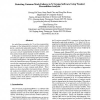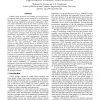417 search results - page 22 / 84 » Detecting Fault Modules Using Bioinformatics Techniques |
117
click to vote
DAC
2003
ACM
16 years 3 months ago
2003
ACM
Software-based self-test (SBST) is an emerging approach to address the challenges of high-quality, at-speed test for complex programmable processors and systems-on chips (SoCs) th...
FDTC
2007
Springer
15 years 8 months ago
2007
Springer
We present a novel non-linear error coding framework which incorporates strong adversarial fault detection capabilities into identity based encryption schemes built using Tate pai...
117
click to vote
ET
2010
15 years 1 months ago
2010
Abstract As technology scales down into the nanometer era, delay testing of modern chips has become more and more important. Tests for the path delay fault model are widely used to...
124
click to vote
APSEC
1997
IEEE
15 years 6 months ago
1997
IEEE
An underlying assumption for N-version programming technique is that independently developed versions would fail in a statistically independent mannel: Howevel; empirical studies ...
100
click to vote
ISCA
2005
IEEE
15 years 8 months ago
2005
IEEE
CMOS scaling increases susceptibility of microprocessors to transient faults. Most current proposals for transient-fault detection use full redundancy to achieve perfect coverage ...



